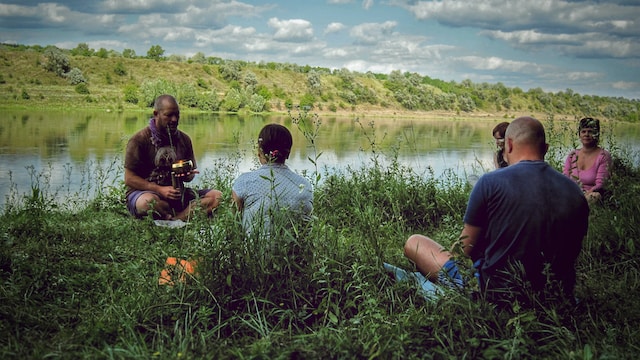Music is a universal language that transcends cultural boundaries, speaking directly to our emotions and influencing our societal interactions. In the realm of music, the concepts of harmony and discord hold significant meaning, both in terms of musical composition and their broader impact on human emotions and society as a whole.
What Does Discord Mean in Music?
In music, the term “discord” refers to a dissonant or harsh combination of musical tones or sounds that create tension and instability within a composition. Discordant elements are characterized by their lack of consonance, creating a sense of unease or conflict in contrast to the more harmonious and pleasant qualities of consonant tones. Discords often involve intervals that are traditionally considered dissonant, such as minor seconds, tritones, and certain extended chords. While discordance can create moments of heightened emotional intensity in music, it is typically resolved by transitioning to consonant harmonies, which provide a sense of resolution and relief. The interplay between discord and consonance is a fundamental aspect of musical composition, allowing composers to manipulate emotions and create dynamic and expressive musical narratives.
The Impact of Music: A Profound Emotional Journey
The impact of music is an extraordinary journey that traverses the landscapes of human emotions with unparalleled depth. Music possesses an uncanny ability to evoke feelings, memories, and sensations, transcending linguistic barriers and resonating with the core of our being. From the joyous cadence of a triumphant melody to the melancholic strains that accompany introspection, music has an innate power to elicit visceral responses. It can uplift spirits, provide solace during times of sorrow, and ignite passion in moments of celebration. The rhythmic pulse and intricate harmonies of music connect directly to our emotions, influencing heartbeats and breathing patterns. Music has been employed across cultures and epochs to communicate complex emotions that words alone may struggle to convey. Whether in a grand symphony hall, an intimate setting, or even within the solitary embrace of headphones, the impact of music transforms the listener, guiding them through a profound emotional journey that mirrors the vast spectrum of human experience.
Why and How Music Moves Us
Music moves us because it possesses an innate ability to tap into the depths of our emotions and resonate with our innermost feelings. This phenomenon can be attributed to the intricate interplay of various musical elements, such as melody, rhythm, harmony, and dynamics, which evoke physiological and psychological responses. Neuroscientific research suggests that when we listen to music, our brains release dopamine, a neurotransmitter associated with pleasure and reward. This chemical reaction amplifies the emotional impact of music, making it a powerful catalyst for evoking joy, nostalgia, sadness, or excitement. Moreover, the universality of music allows it to transcend cultural and linguistic boundaries, enabling individuals from diverse backgrounds to connect on a deeply emotional level. The way music moves us can be attributed to its ability to mirror and amplify our feelings, providing a means of expression and understanding that reaches beyond words. Whether in times of celebration or introspection, music’s capacity to resonate with our inner emotional landscape makes it an extraordinary force that has the power to touch our souls in profound and meaningful ways.
Why Use Discord for Music?
Using Discord for music offers a dynamic platform that fosters real-time collaboration and interaction among musicians and listeners alike. This communication platform, originally designed for gaming, has gained popularity in the music community due to its versatile features. Discord provides dedicated servers where musicians can share their compositions, perform live sessions, and receive immediate feedback from peers and fans. It enables the creation of specialized channels for different aspects of music-making, such as songwriting, production, and instrument-specific discussions, facilitating focused conversations. Additionally, Discord’s integration of voice and video chat capabilities allows for virtual rehearsals, jam sessions, and interviews with artists, transcending geographical barriers. Its text-based channels support the sharing of music-related resources, updates, and event announcements. Discord’s vibrant and customizable interface also provides a sense of community, connecting enthusiasts with similar musical interests. Overall, Discord’s seamless integration of communication tools makes it an appealing choice for musicians to collaborate, learn, and engage with their audiences in innovative and interactive ways.
The Societal Significance of Music
The societal significance of music is profound, as it transcends cultural boundaries and serves as a universal language that binds humanity together. Music not only entertains but also reflects the beliefs, values, and emotions of societies throughout history. It plays a pivotal role in shaping identities, fostering a sense of belonging, and conveying shared narratives. From traditional folk songs that preserve cultural heritage to contemporary compositions that challenge social norms, music has the power to inspire social change and provoke critical conversations. Its ability to evoke emotions can influence public sentiment and mobilize communities for various causes. Moreover, music often accompanies rituals, ceremonies, and celebrations, reinforcing social bonds and reinforcing cultural traditions. Through its capacity to capture the essence of human experiences, music offers a means to understand different perspectives and empathize with diverse realities. Whether in times of joy or hardship, music continues to be a driving force that enriches, connects, and resonates within the fabric of society.
The Melody of Connection
“The Melody of Connection” encapsulates the idea that music possesses a unique ability to bridge gaps and foster a sense of unity among individuals and cultures. Just as musical notes harmonize to create a beautiful composition, music itself harmonizes people’s hearts and minds, transcending linguistic, geographical, and cultural barriers. The diverse rhythms and melodies that emerge from different corners of the world intertwine to form a global tapestry of shared emotions and experiences. Through the universal language of music, people find common ground, understanding, and empathy, forging connections that go beyond words. Whether through live performances, digital platforms, or spontaneous gatherings, the melody of connection resonates, reminding us of our shared humanity and the harmony that can be achieved when people come together to celebrate their individuality within a larger, harmonious whole.
Conclusion
Harmony and discord in music not only represent musical elements but also mirror the intricacies of human emotions and societal interactions. The impact of music on our emotions and society is profound and multifaceted, enriching our lives in ways that often exceed our understanding. As we continue to explore the dynamic relationship between music, emotions, and society, let us appreciate the power of music to harmonize our souls and bridge the gaps that sometimes divide us.

